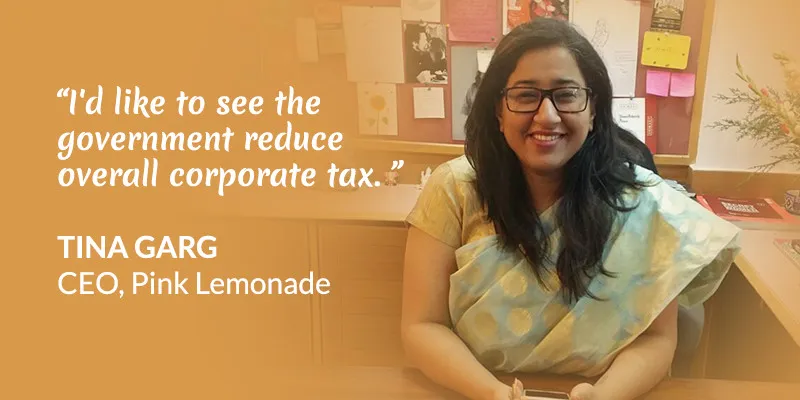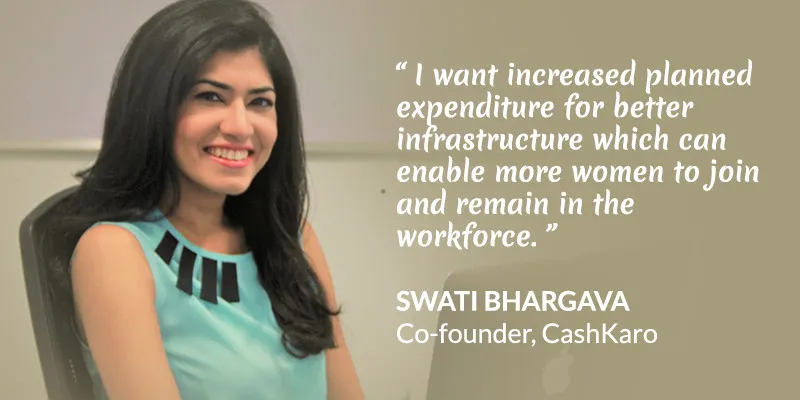Budget 2017: what women leaders and entrepreneurs want this year
The impact of demonetisation and the shift to a cashless economy has not unfolded favourably towards the Modi government. There is more expectation this time round from the government to alleviate the problems and concerns of its citizen.
We spoke to a few women entrepreneurs and leaders to know their Budget expectations this year. The expectations are not far-fetched, but rather essential to make the country’s economy strong. Women need to be equal contributors and this will become a reality if the central government chooses to reach out to this demographic.
Tax cuts
“We look forward to more investments in healthcare and education sector. It would also be nice to see some work around lowering tax on women and making the items affordable, thereby working on gender parity. Lastly, it would be great to have support for the startup world,” says Sairee Chahal, Founder and CEO of SHEROES, a career destination platform for women.
Suchi Mukherjee, CEO and Founder of LimeRoad, says: “In general, tax slabs should be adjusted in a way that it does not reduce the number of people covered in the tax net, but reduces the tax liability of individuals in order to provide them more disposable income that would help to increase the consumption in the country." Suchi says,
"To push digital economy, I wish to see cashless transactions be incentivised further. To boost MSMES, limit of presumptive taxation should be increased to Rs 5 crore. This action will simplify the procedure and conserve resources for small scale vendors."
The Founder of Moya, bespoke crafts created by artisans, Rashmi Singh says, “Some perks and benefits for the salaried class and entrepreneurs who mostly belong to middle and upper middle class would really help a lot! We are just endless taxpayers with literally no return on it! A relaxed taxation policy on startups other than IT would be welcome.”
Aditi Balbir, Founder of V Resorts which provide offbeat stays to travellers, says, “I want the impossible – people who travel to offbeat places and contribute towards local economy should get their travel expenses deduction under 80 C! If someone wanted to boost domestic travel, this would be the way.”
Usha Amin, Co-founder of SHAH Fund, a VC fund by women and for women, says, “The expectation from this Budget is far greater than any before as generally there have been more shocks in place of acchhe din in the waiting. Hopefully, it will remove the lull and boost the economy.”
According to Usha, though the government has provided sops to budding entrepreneurs, including women startups, the tax incentive schemes for Startup India have to be simplified for implementation.
The tax breaks should be extended for five to seven years to be effective and there needs to be a provision for carry forward of losses and also allowed to be set off in the hands of the acquiring companies. There needs to be more thrust on infrastructure and improve the conditions for making it easier to do business in India.
Tina Mansukhani Garg, CEO of Pink Lemonade, says, "One of the things I'd like to see is the government reducing service tax. I feel this is something that can be a pretty big burden for startups to bear, so it would be nice if there were cuts. I'd also like to believe this would help curtail the second economy to a large extent. In addition, I'd like to see the government also reduce overall corporate tax, as this will translate to improved profitability and more money being put towards growth and future investments.”

Women in the workforce
Ankita Vashistha, Co-founder of SAHA Fund, says, “A study by Mckinsey suggested that if women were to participate in the workforce at the same rate as men, India could add $2.9 trillion to the country’s annual GDP by 2025." She adds,
In the coming Budget, I do hope and wish for a strong focus on bringing more women to the workforce. For this to happen and create a huge impact, we must introduce employment policies with a specific focus on women and development of sectors that can absorb and support the women labour force. This has to be pushed by providing the right skills and education from the school level right through to graduation. The government has the responsibility to create awareness programmes, campaigns, training programmes for employment and entrepreneurship. I hope they carve out a sizeable corpus for the same.
Neha Bagaria, Founder of JobsForHer, believes that increasing the labour force participation rate (LFPR) for women is vital to achieving high growth of employment and overall economic growth. “I would like to see the government address the issue of LFPR and WPR (Worker Population Ratio). We hope to see the launch of various legislation-based schemes and other programmes where the emphasis is on female participation.”
Given that Neha is enabling women to restarts their career, she still finds there is a demand-supply mismatch when it comes to women and jobs. She says, “There aren’t enough jobs of the kind that would be acceptable to women who tend to weigh factors like flexibility, security, and travel distance from home more carefully than men before accepting employment. These issues need to be at the centre of economic policies. We would like to see schemes ensuring equality at work, provision of essential services for women, and a supportive legal and political empowerment, through government-led campaigns.”
Swati Bhargava, Co-founder of CashKaro, wants increased planned expenditure for better infrastructure, which can enable more women to join and remain in the workforce. She says,
As a woman and an entrepreneur, I would be most excited to see increased allocation towards building infrastructure in India and increased planned public expenditure. This would go a long way in creating a safer and more conducive environment for women and furthermore in creating world class companies.

According to Geetha Kannan, Managing Director of Anita Borg Institute India, government efforts such as Make in India, Startup India, and Standup India will not have the desired effects till the government nurtures and supports women entrepreneurs. Continued support by the government will help to generate empowerment and financial stability for women.
“We are keen that in the coming Budget, the government has plans to expand schemes like the Rs 500 crore fund for women entrepreneurs and find more ways to ensure it is reaching the targeted beneficiaries. Women entrepreneurs in technology are on the rise and strong initiatives from the government could really help in building successful businesses. Also, tax reforms, initiatives, and policies to further boost the technology sector are always a priority on the budget wishlist,” says Geetha.
Budget allocations exclusively for women
Elsa Marie D’Silva, Founder and CEO of Safecity, says “As a social entrepreneur, I would like the government to provide a distinct allocation of the budget for small female entrepreneurs for innovation, scaling up, and support (under Make in India/Start Up India). I would also like to see budgetary allocation for female maternal healthcare to be increased. Increased allocation of money and improved implementation of ICDS and related schemes will be welcome. There is also a need for separate gender budget cells in each state.”
Making mothers a priority
Naiyya Saggi, Founder of BabyChakra, says, “In the recent amendment to the Maternity Benefit Act, the government mandates every company having more than 50 women employees to have a creche facility. It would be great to incentivise employers with some sops for setting it up. In the absence of sops, employers may be demotivated to hire women/mothers in the workforce which will defeat the purpose itself. We need to have a stronger support system for single women and mothers. Single women constitute 21 percent of India's female population. In many cases, they are single mothers and sole bread-earners. They definitely deserve much lower interest rates on housing loans and other sops to ensure they can take care of their family (parents or children).”
Naiyya also highlights the need for subsidised healthcare facilities, especially for pregnant women and babies. “Even the basic needs during this stage cost anywhere between Rs 50,000 to Rs 1 lakh, which is much higher than the average affordable benchmark for a large part of our population. In the absence of this, the needs of the expecting mother and baby get significantly compromised,” shares Naiyya.
Digital payments
According to Swati Bhargava, Co-founder of CashKaro, “I personally expect the upcoming Union Budget to be very positive and favourable towards the poor, middle class, and business community, particularly because these segments were most inconvenienced by demonetisation. In a bid to alleviate this pain, we can expect incentives on direct tax. This could mean lower personal income tax rates and lower corporate tax rates too. With the cashless economy taking centre stage, the government has already taken a number of steps to encourage electronic payments. We could see Finance Minister Arun Jaitley announcing a list of measures as incentives for digital payments, which will benefit the e-commerce industry as a whole. We might also get clarity on the long-standing topic of introducing GST. Prime Minister Narendra Modi's flagship project, Startup India might get a push in the upcoming budget. We could see a new set of tax concessions on employee stock options, unlisted securities, and convertible instruments. Overall, as a taxpayer and a founder, I am eagerly waiting for February 1.”
Rubeena Singh, CEO of iProspect India, says, “I’m looking forward to more incentives on the digital front that will give an impetus to the cashless economy, initiatives such as cash back on transactions made by card or mobile wallets. Moreover, from an industry perspective, I’m expecting the advertising sector to leverage the unique opportunities demonetisation has paved for specific industries such as BFSI, in terms of ad spends. Also, this budget will hopefully leave more money in the hands of the consumer. This is required to spur demand that appears to have slowed down post demonetisation.”
The expectations from women are loud and clear. There’s no doubt that women entrepreneurs need more benefits and tax cuts, and women, in general, need a conducive environment and infrastructure to contribute to the economy. As we wait for the budget to be presented on February 1, we hope that the government has a finger on the nation's pulse.







